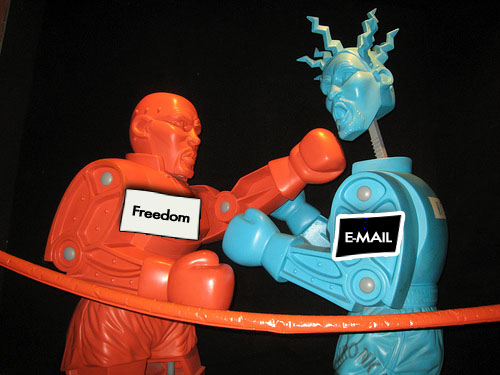Ever lost your camera? Didn’t know how to get it back? Well, please do check out “How To Get Your Camera Back When You Lose It.” You’ll enjoy it.
Monthly Archives: July 2010
The Production of Language
Five weeks ago I came across a quote by Henry Ford. It has remained close to the fore of my thoughts since then.
Speech is one of man’s most marvelous tools and there is a direct relation between the kind of speech which he uses and the kind of work he does.
A good engineer can tell what language a machine ‘been built in just by looking at it. There are some languages in which a machine cannot be built at all. There are some languages in which it would be impossible to efficiently manage a factory.
Ford’s speech has a distinctive directness to it. It’s quietly militant.
This might not surprise those who know Ford’s capitalist success story of the assembly line. There’s a steadiness to his prose that resembles the production line–just look at the repetitive evenness of the last three sentences.
Ford’s quote shows a remarkable grasp of the relationship between language and reality, between our knowledge and our actions. More specifically, it reveals in no uncertain terms how capitalism is successful in large measure because of our language choices.
Ford no doubt would find dreadful a society without “efficient” factories and engines–though we must understand that “efficient” in this context is heavily colored by a capitalist frame of reference. “Efficient,” for Ford* and many other capitalists, for example, means maximizing the externalization of costs, and minimizing accountability in order to maximize profit. “Efficient” will mean something quite different to a Marxist or an environmentalist.
But what Ford dreads is precisely what many are fighting for: a language that makes a capitalist economic model an impossibility.** The goal is a language which cannot support the flagrant exploitation of labor and environment.
Among those broadcasting this message are Michael Hardt and Antonio Negri, authors of Empire, Multitude, and most recently, Commonwealth. One of their principle claims is that a language of resistance is an integral part of any successful resistance movement. Of course, they’re not the only ones saying this, but they are perhaps the only ones saying it that have such a large constituency of readers.
I recently had the privilege of hearing Michael Hardt speak at the Nonstop Institute in Yellow Springs, Ohio. He was very gracious with his time and answers, always working hard to understand the questions as clearly as possible, while remaining sensitive to the questioner’s desires. In short, I was impressed and appreciative, along with many others.
When the microphone came around to me, there were two questions I had in mind, one that relates directly to Ford’s quote. Hardt and Negri use the phrase “production of subjectivity” to discuss how capitalism influences thought- and action-patterns that benefit its continuation. What I’m curious to know–and what I was lucky enough to ask Michael Hardt–is what happens when the key terms we use to critique capitalism are they same that have served its advancement so well? Production is a term very near-and-dear to the capitalist way of life (see, for instance, how Derrick Jensen defines it–premise #5). Do we reinforce certain lines of capitalist thought, even though we’re trying to critique it? When we say “production of subjectivity” do we invoke a frame a reference that is best (if not only) understood through capitalist means?
Check out the video to hear his answer–roughly around the thirty minute mark. (And please excuse my stumbling questioning.)
I’ll leave you with the same questions, as I don’t have any answers right now. There are pros, cons, and in-betweens to all these choices. What does a language of resistance sound like, read like, feel like? On whose shoulders does it fall to create and sustain this language? Should we be spending our energies elsewhere?
hmmm…
—————————————
* Perhaps the most notorious admirer of Ford’s commitment to “efficiency” was Hitler, who told a Detroit News reporter in 1933, “I regard Henry Ford as my inspiration.” Indeed he did: a framed picture of Ford hung in Hitler’s office and he’s the only American mentioned in Mein Kampf. This should indicate clearly enough the devastating consequences of a subjectivity that fetishizes a certain type of “efficiency.”
** On this end of the spectrum we find yet another spectrum: there are those who argue the factory should be owned by the workers and there are those who argue the factory shouldn’t exist at all, no large-scale production facilities period, as they almost invariably support unsustainable economic models. We literally cannot continue an economic system of ravenous extraction and perpetual growth and sustain the ecosystems that make life possible. The fact of this isn’t up for debate–but what we do in response to it most definitely is.
Counter-Persuasion
So, I like ProfHacker. For realsies, it’s one of the few blogs where I read 75% of the posts (it used to be a lot more before they changed their rss feed to only preview the articles). Part of what I like about that blog is that they deal with what I’m going to call, right here, right now, without knowing if there is actually a term out there: counter-persuasion.
It’s like this: our things (supposedly, at least) are made to engage us, but when these things are too engaging we can suffer from the consequences of being distracted from the things we’re supposed to be accomplishing. When I avoid writing because I’m on facebook, it’s because, well, facebook is just so engaging. Or email. Or tv. Or whatever. So, ProfHacker posts such articles as “6 Ways to Avoid Letting Your Computer Distract You.” This article is specifically reporting on programs which aim to reduce or eliminate the technological things that lure you into using them: email, internet, social networking sites, etc. The distracting devices/services/sites cannot persuade you into interacting with them because of these programs which eliminate the distraction altogether. You know where I’m going with this. That’s right, say it with me now: counter-persuasion.
These programs are made specifically to counter act the persuasive temptations that exist with current technology. If you could see the image in my head when I think about this, it looks something like this:
But, I digress.
More or less, I like the cyclical idea here that the software itself is persuasive because it’s reducing the temptations and persuasiveness of other softwares; that the use of counter-persuasion is persuasive itself. It’s a bit convoluted, I grant you, but cool nonetheless.
Synthetic Identity
If your friend, co-worker, family member conveniently leaves their facebook open, resist the temptation to mess with said friend, co-worker, or family member by posting odd/offensive/misrepresenting posts or blocking them out of their account. According to Time, a mother was fined for getting into her son’s account and then blocking him out of it. Of course, as with most things, there seems to be more to their relationship than just this instance as the mother “is also no longer allowed to see her son, who has lived with his grandmother for the past five years.”
By this point, you probably understand that I find facebook utterly fascinating. In this instance, she was charged with harassment, but why not fraud? Or defamation of character?
Just to get this part out of the way, I do not believe that having this woman convicted will mean that parents everywhere will have no supervision over their child’s internet activities. This particular case seemed to have a particularly high level of what was determined to be harassment. The actions appeared to be severe and, therefore, the punishment matched. Forbidding a child to use or post certain things in his or her facebook would not be the same thing.
But on to my thought. Wouldn’t inhabiting someone’s profile and misrepresenting them be fraud more than harassment, because your profile is like a synthetic being? There is this thing out there that stands in for you–it tells everyone who you are and connects you to the people you know, but in Invasion of the Body Snatchers style, it can be jacked and then suddenly, it does not represent you. It does not communicate what you want it to and you have no control over that. Perhaps the charge should be identity theft?
Of course, yes, in this case, it was harassment, but I certainly see the case for identity theft, but, perhaps, this is just semantics?
The Chosen One?
An interesting commentary on the rhetorical moves in LeBron’s TV special:
http://www.rollingstone.com/politics/matt-taibbi/blogs/TaibbiData_May2010/179533/83512
“The Decision” and its reverberations
Perhaps I haven’t been looking too hard to find commentary that says otherwise, but I’d swear I haven’t come across one positive statement about LeBron James and his “Decision” to leave the Cleveland Cavaliers for the Miami Heat. I’m not talking about the decision itself but rather of its execution. If we momentarily ignore the truism that says all publicity is good publicity and look at the merits of the various PR campaigns associated with the event, we might find it safe to say they’ve been a slight disaster. (I’m trying to soften the criticism a bit.)
The two main events are probably the hour-long special on ESPN and the scathing open letter sent out by the Cavaliers owner, Dan Gilbert. The first has been called a “media circus,” “a cultural low point,” and “Embarrassing. Overdone. Underwhelming.” One writer stated that “James was so concerned with the pursuit of his celebrity that he ran [his fans] over with this self-empowering TV special.” Some have found it shameful that James would decide to hold his event at a boys and girls club and proceed to dump his many fans on national television: “[A]lmost overnight, one of basketball’s most likable figures has turned into a complete jerk.” One blogger even has even written a press release that should have been — but, sadly, wasn’t.
Dan Gilbert’s open letter has fared no better. It has been endlessly criticized, is costing him a whopping $100,000 in fines, and has even mysteriously disappeared from the NBA web site. The original letter showed up in Comic Sans font, a font style universally hated by folks in the design community. Apparently, the media relations staff at the Cavaliers “begged Gilbert to not send the email, but he ignored the pleas and wanted it out immediately.” I wholeheartedly feel their pain.
The letter has been compared to “10th grade melodrama,” the reaction a slave owner would have to his runaway slave (although others claim that Jesse James’ criticism actually makes Gilbert look better), and a venomous validation for James’ exit. It’s clearly a letter written in anger that would have greatly benefited from a calm eye and a red pen.
If you’re curious, here’s a copy (and here’s a visual of the original at this site). Do tell us what you think.
Dear Cleveland, All Of Northeast Ohio and Cleveland Cavaliers Supporters Wherever You May Be Tonight;
As you now know, our former hero, who grew up in the very region that he deserted this evening, is no longer a Cleveland Cavalier.
This was announced with a several day, narcissistic, self-promotional build-up culminating with a national TV special of his “decision” unlike anything ever “witnessed” in the history of sports and probably the history of entertainment.
Clearly, this is bitterly disappointing to all of us.
The good news is that the ownership team and the rest of the hard-working, loyal, and driven staff over here at your hometown Cavaliers have not betrayed you nor NEVER will betray you.
There is so much more to tell you about the events of the recent past and our more than exciting future. Over the next several days and weeks, we will be communicating much of that to you.
You simply don’t deserve this kind of cowardly betrayal.
You have given so much and deserve so much more.
In the meantime, I want to make one statement to you tonight:
“I PERSONALLY GUARANTEE THAT THE CLEVELAND CAVALIERS WILL WIN AN NBA CHAMPIONSHIP BEFORE THE SELF-TITLED FORMER ‘KING’ WINS ONE”
You can take it to the bank.
If you thought we were motivated before tonight to bring the hardware to Cleveland, I can tell you that this shameful display of selfishness and betrayal by one of our very own has shifted our “motivation” to previously unknown and previously never experienced levels.
Some people think they should go to heaven but NOT have to die to get there.
Sorry, but that’s simply not how it works.
This shocking act of disloyalty from our home grown “chosen one” sends the exact opposite lesson of what we would want our children to learn. And “who” we would want them to grow-up to become.
But the good news is that this heartless and callous action can only serve as the antidote to the so-called “curse” on Cleveland, Ohio.
The self-declared former “King” will be taking the “curse” with him down south. And until he does “right” by Cleveland and Ohio, James (and the town where he plays) will unfortunately own this dreaded spell and bad karma.
Just watch.
Sleep well, Cleveland.
Tomorrow is a new and much brighter day….
I PROMISE you that our energy, focus, capital, knowledge and experience will be directed at one thing and one thing only:
DELIVERING YOU the championship you have long deserved and is long overdue….
Dan Gilbert
Majority Owner
Cleveland Cavaliers
The Penguins are Back at it
Remember this post:
http://harlotofthearts.org/blog/2008/12/26/hey-whered-my-egg-go/
Yeah, well, according to the LA Times, the eggs have hatched and, to the surprise of no liberal, these gay penguins make just as good parents as any straight penguin couple. I’m just waiting for this to be used as an argument for LGBT rights. Personally, I think it’s a good counter-argument to the “it’s not natural” spiel, but that may just be me.



